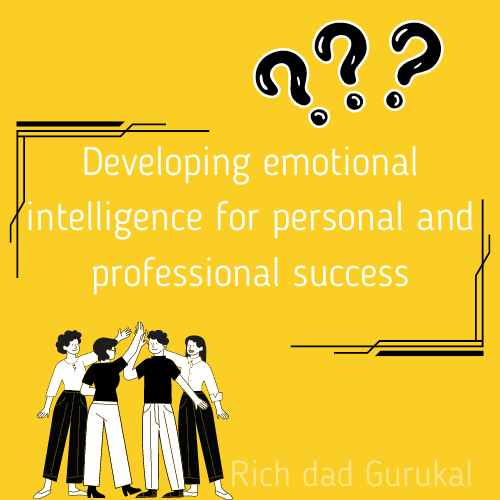Developing emotional intelligence for personal and professional success
Emotional intelligence (EI) refers to the ability to understand and manage one’s own emotions and the emotions of others. It is a vital skill to have, especially in today’s world where social interactions and relationships play a significant role in both personal and professional success.
Developing emotional intelligence is a gradual process that requires a lot of self-awareness and empathy towards others. Here are some strategies that can help in developing emotional intelligence for personal and professional success:
-
Self-awareness: The first step towards developing emotional intelligence is to become more self-aware. This involves understanding your own emotions and how they influence your thoughts, behaviors, and decisions. You can improve self-awareness by regularly reflecting on your emotions, values, and beliefs.
-
Empathy: Empathy is the ability to understand and feel the emotions of others. It involves being able to put yourself in someone else’s shoes and see things from their perspective. Developing empathy requires active listening skills, asking open-ended questions, and showing genuine interest in other people’s lives.
-
Emotion regulation: Emotion regulation refers to the ability to manage and control one’s own emotions. This involves recognizing and understanding your own emotional triggers and finding healthy ways to cope with them. Examples of healthy coping mechanisms include exercise, meditation, and deep breathing exercises.
-
Social skills: Social skills involve the ability to interact effectively with others. This includes being able to communicate clearly, resolve conflicts, and build positive relationships with others. Developing social skills requires practicing active listening, assertiveness, and conflict resolution techniques.
-
Positive attitude: A positive attitude can help in developing emotional intelligence by fostering a growth mindset. This involves believing in your ability to learn, grow, and improve over time. A positive attitude can also help in cultivating empathy and compassion towards others.
-
Practice self-care: Practicing self-care can help in developing emotional intelligence by reducing stress and promoting overall well-being. This includes getting enough sleep, eating a balanced diet, and engaging in activities that you enjoy.
Developing emotional intelligence takes time and effort, but the benefits are well worth it. Here are some ways in which emotional intelligence can lead to personal and professional success:
-
Better relationships: Developing emotional intelligence can help in building positive relationships with others. This includes being able to communicate effectively, understand others’ perspectives, and resolve conflicts in a healthy manner.
-
Increased self-awareness: Developing emotional intelligence can lead to increased self-awareness. This involves understanding your own emotions and how they influence your thoughts and behaviors. Increased self-awareness can help in making better decisions and setting meaningful goals.
-
Improved communication skills: Developing emotional intelligence can lead to improved communication skills. This includes being able to express yourself clearly and effectively, listen actively to others, and respond in a way that is appropriate for the situation.
-
Better leadership skills: Developing emotional intelligence can help in developing better leadership skills. This includes being able to inspire and motivate others, build positive relationships with team members, and handle conflicts effectively.
In conclusion, developing emotional intelligence is an essential skill for personal and professional success. By improving self-awareness, empathy, emotion regulation, social skills, and practicing self-care, you can cultivate a growth mindset and build positive relationships with others. The benefits of emotional intelligence include better relationships, increased self-awareness, improved communication skills, and better leadership skills.

